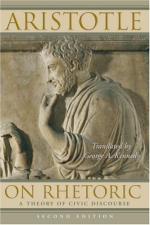
|
| Name: _________________________ | Period: ___________________ |
This quiz consists of 5 multiple choice and 5 short answer questions through Book II, Chapters 12-22.
Multiple Choice Questions
1. In the beginning of the book, which one of the following did Aristotle indicate about rhetoric?
(a) It was neither an art nor a science.
(b) It was an art.
(c) It was an art and a science.
(d) It was a science.
2. According to Aristotle, what was the general difference between enthymemes and examples?
(a) Enthymemes were more persuasive than examples.
(b) Examples were more persuasive than enthymemes.
(c) Both enthymemes and examples were just as persuasive.
(d) Neither enthymemes nor examples were persuasive.
3. What types of examples did Aristotle discuss in Book II, Chapter 20?
(a) Actual facts and invented facts.
(b) Actual facts and hypothetical facts.
(c) Actual facts, hypothetical facts, and invented facts.
(d) Hypothetical facts and invented facts.
4. In Aristotle's opinion, which things did a criminal consider when choosing their victim?
(a) Vulnerability and convenience.
(b) Value and convenience.
(c) Vulnerability, value, and convenience.
(d) Vulnerability and value.
5. As explained by Aristotle, what comprised good?
(a) Only one main thing.
(b) Only two main things.
(c) Many different things.
(d) A few different things.
Short Answer Questions
1. Of the two kinds of witnesses, why did Aristotle think the ancient witnesses were useful?
2. Which one of the following was mentioned by Aristotle as a way that anger was useful in oratory?
3. Continuing the theme of Aristotle's logic, what could be used to deduce the impossible?
4. As explained in Book I, Chapter 10, what did the general law refer to?
5. According to Aristotle, what was the orator's chief goal?
|
This section contains 342 words (approx. 2 pages at 300 words per page) |

|




